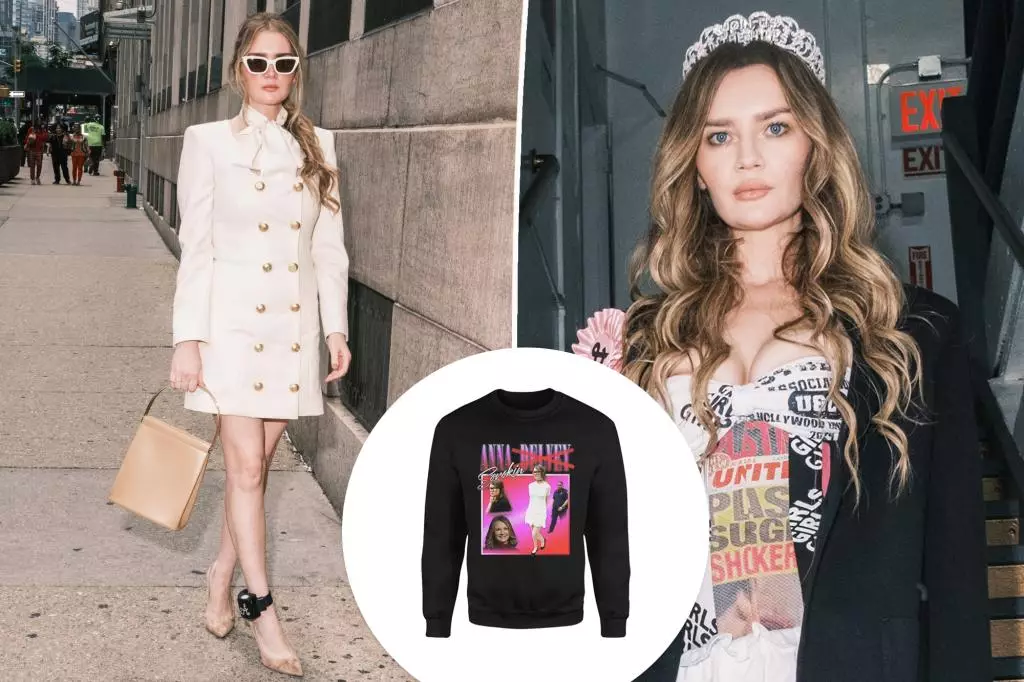Anna Delvey, born Anna Sorokin, has transitioned from a notorious fraudster to a self-styled fashion mogul, stirring up considerable drama in the wake of her infamous criminal history. Recently, Delvey made headlines by sending a cease-and-desist letter to Walmart, which had begun selling merchandise emblazoned with her name and likeness. This unexpected turn of events highlights the complexities tied to her rebranding efforts and raises questions about intellectual property rights in the realm of celebrity culture.
Delvey earned widespread notoriety for impersonating a wealthy American heiress and scamming various businesses and individuals out of a staggering $250,000 in the years leading up to her 2019 conviction for grand larceny and theft of services. After serving time in prison, she emerged with ambitions far removed from her previous life of deceit. Just before her release, Delvey trademarked her criminal alias, positioning herself to capitalize on her newfound notoriety in the fashion world.
Upon discovering that Walmart was leveraging her trademarked name for profit, Delvey’s legal team, led by attorney Duncan Levin, sprang into action. The cease-and-desist letter described Walmart’s actions as “egregious” infringement upon her federally registered trademark, arguably pushing the envelope of acceptable business conduct. Delvey’s sudden leap into the fashion industry illustrates a growing trend where previous criminals utilize their public personas—often criminal or controversial—to create lucrative brands.
Filed in September 2022, Delvey’s trademark covers a broad range of clothing items including dresses, hats, hoodies, and more. The registration indicates a serious intent to develop a business empire focused on her brand, which the public continues to find both fascinating and problematic. Her legal response to Walmart’s alleged infringements underscores the importance of intellectual property—a realm that is particularly contentious when it intersects with notoriety and celebrity status.
Rebranding oneself after serving time is no small feat, especially for someone like Delvey, whose past is marked by deceit and emotional manipulation. In the post-prison landscape, Delvey appears focused on transforming the narrative surrounding her life. She has established a fashion public relations firm called the Outlaw Agency, enlisting the assistance of industry heavyweight Kelly Cutrone, suggesting that she’s serious about embedding herself in the fashion sphere.
This new ambition, fueled by a need for both rehabilitation and recognition, is compounded by her ongoing legal threats against media outlets and individuals who seek to paint her in a negative light. For instance, after Whoopi Goldberg made comments on “The View” suggesting that Delvey still owes money to her victims, Delvey’s legal team issued a stern response, asserting that she has repaid her dues.
It’s also important to measure how much of this public relations effort is tailored to resonate with an audience that is both dazzled and appalled by her story. Thus far, she seems to be reaping the benefits of her new identity, capturing media attention that can easily pivot into commercial opportunities.
The fascination with figures like Anna Delvey speaks volumes about society’s preoccupation with audacity and rebellion against societal norms. Her story is not just one of crime; it is an exploration of identity, culture, and entrepreneurship. In a world where celebrity status can be built on controversy, the lines blur between the right to profit from one’s history and the ethical questions surrounding such endeavors. Delvey’s saga serves as a mirror for society, reflecting our values and the sometimes troubling fascination with those who stray from the path of conventional morality.
Despite her past transgressions, Delvey has managed to cultivate a compelling personal brand. As she navigates her way through the complexities of notoriety, legal negotiations, and the fashion market, the world watches—not merely to critique but also to be entertained. The stakes are high, and the future remains uncertain, but one thing is clear: Anna Delvey is not going quietly into the night. Instead, she is poised to remain a controversial figure in both the fashion world and popular culture for years to come.

